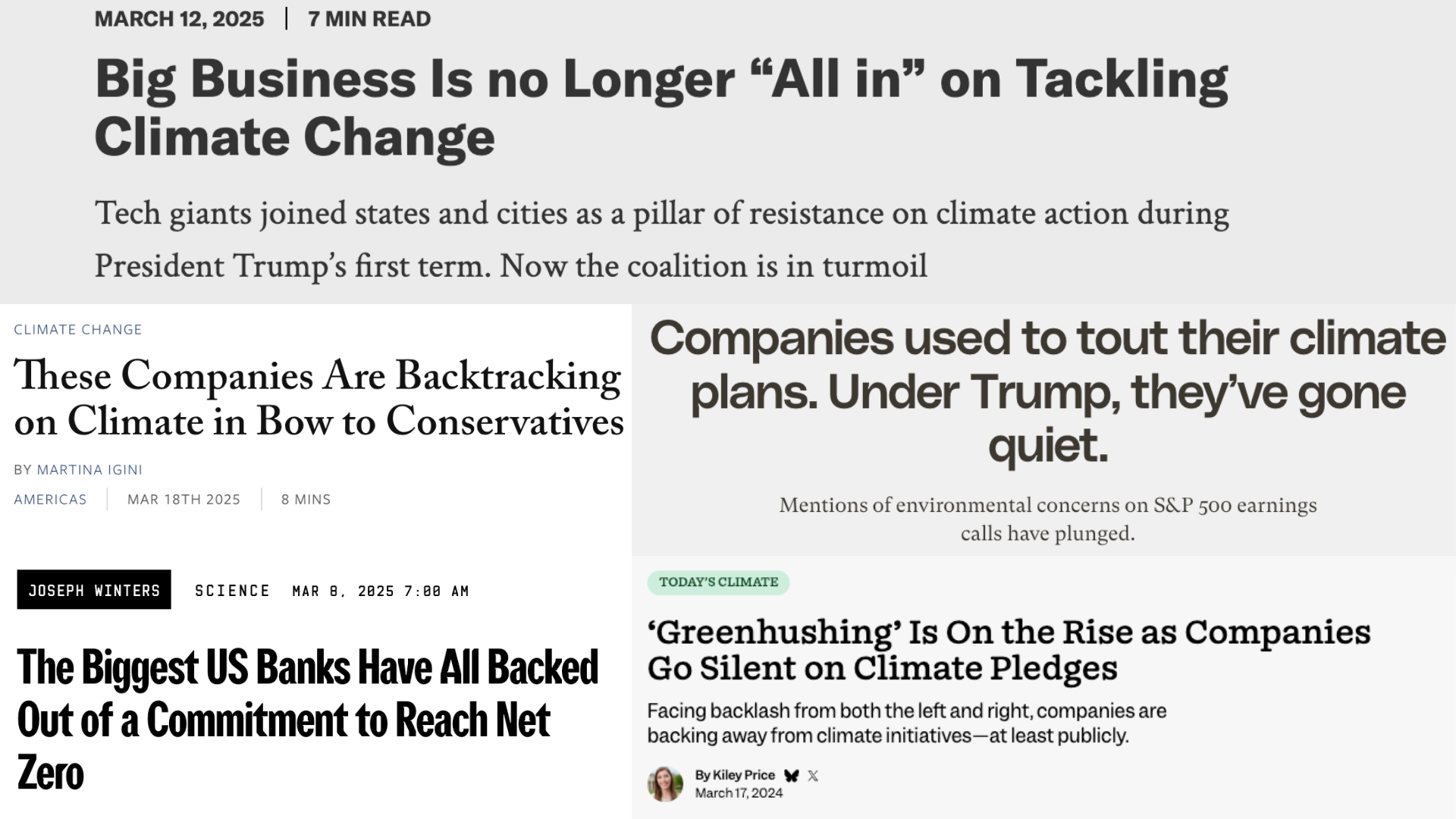Some companies, however, have chosen to ride the changing political tides and step away from their climate commitments. Many banks are leaving the sector’s largest climate coalition, and a number of companies are backing out of public climate advocacy. So, it’s hard to feel optimistic about corporate climate action right now, especially when some notable companies once seen as leading on climate are now in apparent cahoots with an administration that continues to deny science and actively tries to tear down any progress on climate change in the name of “drill, baby, drill.”
Corporate sustainability isn't backing down – but was it really bold enough in the first place?

As the Trump Administration dismantles environmental safeguards, from targeting rules that limit power plant and car pollution to speeding up permitting processes for fossil fuel projects – actions that will put all of us at further risk from climate change – companies must play a vital role in filling the climate action gaps left by the federal government.
Thankfully, a new PwC report shows that we might have more reason for hope than we thought. Analyzing data from over 4,000 companies, the report found that 37% of companies are increasing their sustainability ambitions, compared to just 16% that are pulling back their efforts. Despite what headlines may lead us to believe, the fact is that over 80% of companies are either keeping their climate goals or accelerating them – most of us just aren’t hearing about the progress.
This disconnect between what companies are perceived to be doing versus actually doing could be strategic. In an era of political backlash, some companies may be engaging in “greenhushing,” taking quiet action on climate without the self-promotional fanfare. However, some studies suggest there is scant evidence of greenhushing, and that companies may simply be increasing transparency on their climate efforts in light of new disclosure rules. Whatever the case may be, the vast majority of businesses are still progressing toward their net-zero goals, just without the baggage of triggering phrases like “ESG.”
Though it’s tempting to say this is because businesses believe in the better future that awaits the world through serious climate action, the reality may be more calculus than conscience. Sustainability innovation simply leads to better business outcomes: The recent PwC study also found that sustainable products increased revenues 6–25% compared to other products. Additionally, of the companies that disclosed actual and projected revenue data, on average, they anticipated that more than one-third of their revenue by 2030 will come from the climate transition, through investments in things like electric vehicles, low-carbon cement, plant-based protein alternatives, and others. Regardless of what those in power may say, sustainability action is a business advantage, and ambition isn’t slowing down – and that’s good news.
While it’s great that many companies are still committed to climate regardless of the political environment, we shouldn’t automatically sing their praises just yet. Momentum is undoubtedly building, but on the whole, corporate climate action is nowhere near the scale, speed, and urgency that the climate crisis demands. Worse, this ambition doesn’t always translate to action. A 2024 Accenture study found that only 16% of the world’s 2,000 largest companies are on track to meet their net-zero targets. Moreover, sustainability teams are often under-resourced and overburdened with accounting and reporting: An IBM report shows that spending on sustainability reporting exceeds that on sustainability innovation by 43%. If companies are serious about reaching their goals, they need to adequately support sustainability teams and empower every employee to contribute to climate action.
It’s also critical to dissect which companies are progressing in their climate aspirations and which aren’t. PwC found that sectors like agriculture, food and beverage, shipping, and industrials all have relatively low climate ambition. With the global food system alone being responsible for between 22–33% of global emissions, how can we achieve real progress when high-emitting sectors aren’t pulling their weight?
Finally, every company has its own definition of “ambitious” climate action. When we consider the full influence that companies have on the climate, from their financial and political power to their ability to shape behaviors and culture, we start to see that many corporate sustainability plans are not up to snuff. This is clearly indicated by the fact that Scope 3 emissions (indirect emissions that occur in a company’s value chain, such as from the use of their products) are often overlooked in accounting and reporting. A survey of companies disclosing to CDP, an organization that runs a prominent environmental disclosure system, found that only 15% have set a Scope 3 target. This is troubling, considering these emissions can be up to 26 times greater than direct emissions.
Most companies also ignore other parts of their business that may be indirectly contributing to climate change beyond their value chain, such as their cash and investments, political contributions, and partnerships with service providers. Investments held in major banks may be used to finance fossil fuel projects; government affairs teams could be contributing to candidates known for obstructing climate policy; and hired creative agencies, lawyers, and other services may have fossil fuel clients in their portfolios. While it’s critical that companies lower their emissions, they cannot neglect the vast influence of their money and patronage.
Perhaps the most important takeaway from the PwC report is that companies need to go big on their climate commitments. The report found that companies with higher Scope 1 and 2 ambition, defined as those with bigger relative annual reduction targets, tend to be more on track to meet their sustainability targets than those with conservative goals. Companies should also look at every aspect of their business, moving beyond net zero toward becoming a driving force for the climate transition. We won’t stop climate change and usher in a prosperous future with lackluster commitments. But with bold declarations, companies just might be more inclined to take bold action. With or without United States federal support, the time has never been more ripe for corporate sustainability to step up and reach its full potential.
Aiyana Bodi, Project Drawdown manager of employee engagement, works with corporate partners and their employees to scale climate solutions in more meaningful and impactful ways. Aiyana is passionate about intersectional environmentalism and aims to use employee activation as a vehicle for just and equitable solutions.
This work was published under a Creative Commons CC BY-NC-ND 4.0 license. You are welcome to republish it following the license terms.





